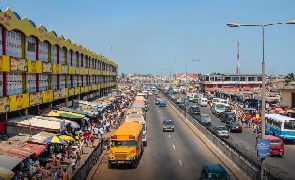 File photo of the Kaneshie market in Accra
File photo of the Kaneshie market in Accra
The West African Development Outlook (WADO) is projecting economic activity in most Economic Community of West African States’ (ECOWAS) economies to rebound over the next two years while inflation is expected to decelerate, leading to improved conditions compared with 2022.
WADO, an annual publication by the ECOWAS Bank for Investment and Development (EBID), explained that economic activity will end this year at 3.8 percent; rebounding to 4.1 percent in 2024 on account of more stable prices.
The West African Economic and Monetary Union (WAEMU) is also expected to record an uptick in economic activity, growing at 6.1 percent in 2023 and further to 6.5 percent in 2024. On the other hand, gross domestic product (GDP) growth in the West African Monetary Zone plus Cabo Verde (WAMZ+) is projected to slow to 3.1 percent in 2023 before reaching 3.4 percent in 2024.
With respect to inflation, it projected a marginal easing to 16.7 percent in 2023 and further to 14.1 percent in 2024 for the ECOWAS region.
Similarly, it said, in 2023 the WAMZ+ will witness a marginal decline in inflation to 20.0 percent and record a significant decline to 17.1 percent in 2024.
Notwithstanding the above positive outlook of economic activity in 2024 for the ECOWAS region, the WADO report also outlined six possible downside risks the West African economy faces – which, if not contained, could derail prospects and worsen risks.
Considering how crude oil prices played a momentous role in initiating the inflation spiral of 2022 – and the Organisation of Petroleum Exporting Countries’ (OPEC) decision in April 2023 to cut crude oil output by 1.16 million barrels per day – WADO cautioned that if crude oil prices remain elevated, chances are that inflation will remain doggedly high in the sub-region and that the growth targets will not be achieved; leading to adverse impacts on poverty targets in the short- to medium-term.
It added that the Russia-Ukraine conflict continues to pose risks for macroeconomic stability; and depending on what the next phase of the war will be, there could be negative implications for food security, inflation and economic growth – given the two warring countries’ stake in global trade. An end to the war would meanwhile have an upside potential for global output.
In the meantime, the report indicates that the longer the war persists, the more the risk of adverse impacts lingering.
Another downside risk that is likely to impede the projected growth in economic activity within the ECOWAS region is increase in food prices. The report holds that if food supplies fall short of expectation, it will trigger another bout of persistent inflation in 2023.
Apart from favourable weather patterns, it said there is need to unclog food supply chains to ensure that what befell the world in first-half 2022 does not recur.
Per the report, other factors include monetary policy rate hikes, currency depreciation and insecurity.
To help mitigate the impact of a high inflationary environment and other socio-economic challenges, the WAPO2023 also recommended some policy options.
Key among its recommendations is that ECOWAS countries work toward using local currencies in intra-regional and intra-Africa trade by taking advantage of the Pan-African Payment and Settlement System (PAPSS) platform, as envisaged under the African Continental Free Trade Area (AfCFTA) framework.
This will help bring more stability to local currencies, given that it will lead to a reduction in demand for the dollar; giving them a better handle on inflation.
Other policy options WADO2023 proposed include the need to rethink intra-regional trade, followed by improving labour productivity and increasing electricity coverage.